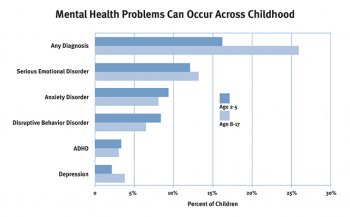
Mental health Issues in Childhood
Significant mental health problems can and do occur in young children.
In some cases, these problems can have serious consequences for early learning, social competence, and lifelong physical health. Children can show clear characteristics of anxiety disorders, attention-deficit/hyperactivity disorder, conduct disorder, depression, posttraumatic stress disorder, and neurodevelopmental disabilities, such as autism, at a very early age. That said, young children respond to and process emotional experiences and traumatic events in ways that are very different from older children and adults. Consequently, diagnosis in early childhood can be even more difficult than it is in adults.

The interaction between genes and environment shapes mental health.
Impairment in mental health occurs as a result of the interaction between a child’s genetic predispositions and his or her exposure to significant adversity in the environment. Genes are not destiny. Our genes contain instructions that tell our bodies how to work, but the environment leaves a “signature” on the genes that authorizes or prevents those instructions from being carried out—or even speeds up or slows down genetic activity. Thus, the interaction between genetic predispositions and sustained, stress-inducing experiences early in life can lay an unstable foundation for mental health that endures well into the adult years.
Experiencing toxic stress can increase the likelihood of mental health issues.
Toxic stress, which is the result of strong, frequent, and/or prolonged biological responses to adversity, can damage the architecture of the developing brain and increase the likelihood of significant mental health problems that may emerge either quickly or years later. Because of its enduring effects on brain development and other organ systems, toxic stress can impair school readiness, academic achievement, and both physical and mental health in children and, later, adults. Life circumstances associated with family stress, such as persistent poverty, threatening neighborhoods, and very poor child care conditions elevate the risk of serious mental health problems. Young children who experience recurrent abuse or chronic neglect, domestic violence, or parental mental health or substance abuse problems are particularly vulnerable.
Early trauma can have lasting effects.
Some individuals demonstrate remarkable capacities to overcome the severe challenges of early, persistent maltreatment, trauma, and emotional harm, yet there are limits to the ability of young children to recover psychologically from such adversity. Even when children have been removed from traumatizing circumstances and placed in exceptionally nurturing homes, developmental improvements are often accompanied by continuing problems in self-regulation, emotional adaptability, relating to others, and self-understanding. When children overcome these burdens, they have typically been the beneficiaries of exceptional efforts on the part of supportive adults. These findings underscore the importance of prevention and timely intervention in circumstances that put young children at serious psychological risk.
It is essential to treat young children’s mental health problems within the context of their families, homes, and communities.
The emotional well-being of young children is directly tied to the functioning of their caregivers and the families in which they live. When these relationships are abusive, threatening, chronically neglectful, or otherwise psychologically harmful, they are a potent risk factor for the development of early mental health problems. In contrast, when relationships are reliably responsive and supportive, they can actually buffer young children from the adverse effects of other stressors. Therefore, reducing the stressors affecting children requires addressing the stresses on their families.
Policy Implications
- The emotional and behavioral needs of vulnerable infants, toddlers, and preschoolers are best met through coordinated services that focus on their full environment of relationships, including parents, extended family members, home visitors, providers of early care and education, and/or mental health professionals. Mental health services for adults who are parents of young children would have broader impact if they routinely included attention to the needs of the children as well.
- Physicians and providers of early care and education would be better equipped to understand and manage the emotional and behavioral problems of young children if they had more appropriate professional training and easier access to child mental health professionals when they are needed.
- Better coordination of resources invested in mental health services for young children and their parents would provide a more stable and efficient vehicle for assuring access to effective prevention and treatment programs
Suggested citation: Center on the Developing Child (2013). Early Childhood Mental Health (InBrief). Retrieved from www.developingchild.harvard.edu.









